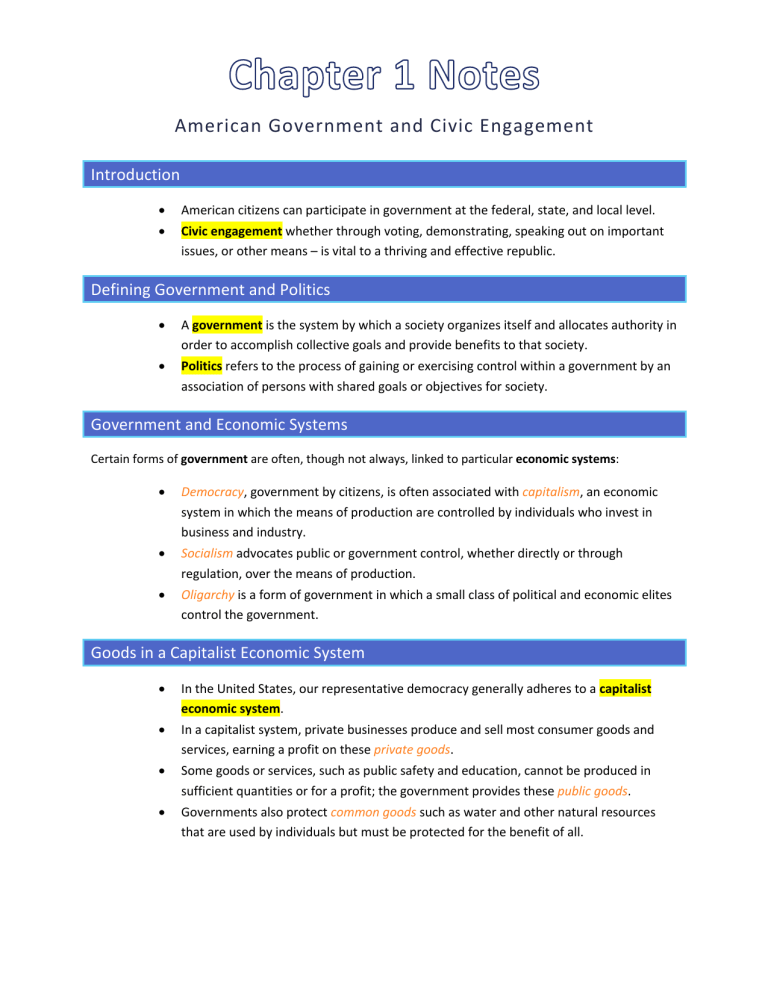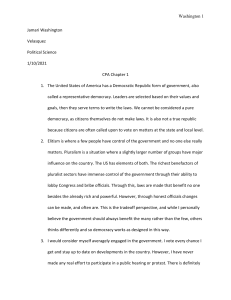
American Government and Civic Engagement Introduction • • American citizens can participate in government at the federal, state, and local level. Civic engagement whether through voting, demonstrating, speaking out on important issues, or other means – is vital to a thriving and effective republic. Defining Government and Politics • A government is the system by which a society organizes itself and allocates authority in order to accomplish collective goals and provide benefits to that society. • Politics refers to the process of gaining or exercising control within a government by an association of persons with shared goals or objectives for society. Government and Economic Systems Certain forms of government are often, though not always, linked to particular economic systems: • Democracy, government by citizens, is often associated with capitalism, an economic system in which the means of production are controlled by individuals who invest in business and industry. • Socialism advocates public or government control, whether directly or through regulation, over the means of production. • Oligarchy is a form of government in which a small class of political and economic elites control the government. Goods in a Capitalist Economic System • In the United States, our representative democracy generally adheres to a capitalist economic system. • In a capitalist system, private businesses produce and sell most consumer goods and services, earning a profit on these private goods. • Some goods or services, such as public safety and education, cannot be produced in sufficient quantities or for a profit; the government provides these public goods. • Governments also protect common goods such as water and other natural resources that are used by individuals but must be protected for the benefit of all. Types of Government: Democracy A democracy is a form of government in which political power – influence over institutions, leaders, and policies – is controlled by the people. • In a representative democracy, such as the United States, citizens do not govern directly; government institutions and policy are determined by elected representatives. Representative democracies, however, often have a check on the power of citizens in order to protect the rights of minorities. • In a direct democracy, people participate directly in government decisions, instead of relying on elected representatives. Types of Government: Monarchy & Totalitarian 2 • In an absolute monarchy, a single, usually hereditary, ruler holds political power. - Many modern monarchies limit the monarch’s power with some form of representative government, such as a parliament. • Under totalitarian governments, the state, usually controlled by a single leader or small group of elites, controls virtually every aspect of citizens’ lives. Elitism vs. Pluralism • Within a representative democracy, the elite theory of government holds that a small group of elites controls power while other citizens have little or no influence. • The pluralist theory of government holds that competing interest groups influence the government and hold political power. - Citizens may influence the government by becoming involved with groups that share similar interests and engaging with their representatives at a local, state, or national level. The Tradeoffs Perspective • The tradeoffs perspective acknowledges that competing interests, whether elitist or pluralist, vie for government influence. • These competing interests produce government actions and public policies that are influenced by a series of tradeoffs or compromises. Changes in Involvement • Traditionally, citizens engaged in democracy through membership in and advocacy on behalf of small groups, such as churches, local labor unions, and other groups. • Today, changes in society and technology leave many citizens with less time to be active members of a civic organization; instead, citizens join larger national organizations in which each individual typically plays a small role. Why Get Involved? • Social capital is the collective value of all social networks and the willingness of these networks to work together toward a common goal. • Civic engagement increases the power of an individual to influence government policies and actions. • A representative democracy requires an informed citizenry to vote for candidates and advocate for desired policies, along with other forms of civic engagement. Pathways to Engagement 3 • Civic engagement may be undertaken individually or as a member of a group. • Forms of individual civic engagement include staying informed about current events, voting, giving to a political campaign, and contacting elected representatives about issues. • Forms of civic engagement through groups include discussing issues, working for a political campaign, volunteering, or fundraising for an organization that shares one’s goals, registering people to vote, joining protests or marches, boycotting businesses that do not support one’s views, and many others. Factors of Engagement Approximately two-thirds of Americans engaged in some form of political action in 2008, a presidential election year. These activities typically included some form of impersonal action, such as signing petitions or contributing to a political campaign. Factors of Engagement: Age Americans under the age of 30 are less likely to engage in partisan politics. • In a 2015 survey by the Harvard University Institute of Politics, more young Americans claimed affiliation with independents (40%) than Democrats (36%) or Republicans (21%). • Americans under 30 are less likely to participate in political action, but many engage in civic activities, such as volunteering to provide community services. Factors of Engagement: Wealth and Education In addition to age, civic engagement is also greatly influenced by wealth and education: wealthier and more educated citizens are more likely to vote. 4 R EVIEW Q UESTIONS 1. What goods are available to all without direct payment? a. private goods b. public goods c. common goods d. toll goods 2. In which form of government does a small group of elite people hold political power? a. direct democracy b. monarchy c. oligarchy d. totalitarian 3. What is the difference between a representative democracy and a direct democracy? In a representative democracy, people elect representatives to make political decisions and pass laws for them. In a direct democracy, people make all political decisions and pass laws themselves. 4. What does government do for people? Government provides stability to society, as well as many crucial services such as free public education, police and fire services, and mail delivery. It also regulates access to common goods, such as public land, for the benefit of all. Government creates a structure whereby people can make their needs and opinions known to public officials. 5. The elite theory of government maintains that __________. 5 a. b. c. d. 6. 7. 8. 9. 10. 11. special interest groups make government policy politicians who have held office for a long time are favored by voters poor people and people of color should not be allowed to vote wealthy, politically powerful people control government, and government has no interest in meeting the needs of ordinary people According to the pluralist theory of government, __________. a. government does what most voters want it to do b. government policy is formed because of the competition between groups with different goals and interests c. ordinary people acting on their own have a significant influence on government d. wealthy people decide what government policy will be, and politicians have no interest in pleasing anyone else Which of the following is a good example of a tradeoff? a. the government pleases environmental activists by preserving public lands but also pleases ranchers by allowing them to rent public lands for grazing purposes. b. the government pleases environmental activists by reintroducing wolves to Yellowstone National Park but angers ranchers by placing their cattle in danger. c. the government pleases oil companies by allowing them to drill on lands set aside for conservation but allows environmental activist groups to protest the drilling operations. d. groups that represent a variety of conflicting interests are all allowed to protest outside Congress and the White House. Supporting the actions of the Democratic Party simply because one identifies oneself as a member of that party is an example of __________. a. partisanship b. ideology c. latent preference d. social capital When a person is asked a question about a political issue that person has little interest in and has not thought much about, the person’s answer will most likely reflect __________. a. Ideology b. partisanship c. intense preferences d. latent preferences What kinds of people are most likely to become active in politics or community service? People with higher levels of income and education. What political activities can people engage in other than running for office? People can pay attention to the news to be aware of the most important issues of the day. They can contribute money to a campaign or attend a rally in support of a political candidate who views they favor. They can write letters to members of Congress and to state and local politicians. They can vote. 6 C RITICAL T HINKING Q UESTIONS 12. Is citizen engagement necessary for a democracy to function? Explain. Citizen engagement is crucial in a democracy. If citizens do not become engaged in government through actions such as becoming acquainted with the issues, signing petitions, and voting, then laws will not change at local, state, or national levels. Politicians are interested in what potential voters have to say, and unless they know what is of concern to most ordinary people, they will not know how to act to please the voters once elected. Although many people fear that the wealthy exercise great power in government, those who feel this way should realize that without citizen engagement, there will be even fewer restrictions on the power of elites. 13. Which is the more important reason for being engaged: to gain power or improve the quality of life? Why? The more important reason for being engaged is to improve the quality of life because the job of the government is to care for its citizens and to hear their requests to make their lives better. 14. Are all Americans equally able to become engaged in government? What factors make it more possible for some people to become engaged than others? What could be done to change this? Political engagement is easier for some citizens than others. Those with higher levels of income and education and more free time can contribute money to fundraising efforts and volunteer for campaigns or become active in interest groups. However, there are forms of engagement in which all can participate: listening to the news, answering surveys, and voting. To make it easier to participate, voter registration could be made easier and laws making it difficult for students to vote outside their states of residence could be changed. 15. Which pathways of engagement in U.S. government do you plan to follow? Why do you prefer these approaches? The pathways of engagement in U.S. government that I plan to follow are watching the news and reading news articles. I prefer these approaches because they are the simplest ways to stay informed and they just put the facts out there and not the “filler.” 16. Are there any redeeming qualities to elitism and any downsides to pluralism? Are there benefits to having elites rule? Are there problems with allowing interest groups to exercise influence over government? Explain. The redeeming quality to elitism is that they can’t be influenced easily by outside sources. The downside to pluralism is that the people don’t have any power to change anything. There are benefits to having elites rule because they can get things done way faster than it would take for a democratic government to process. There are problems with allowing interest groups to exercise influence over government because they just make the whole process longer and it involves more unnecessary debating. It could also lead to problems down the line with constituents who dislike the direction of the government but can’t do anything about it because they want to support the government’s backers. 7


